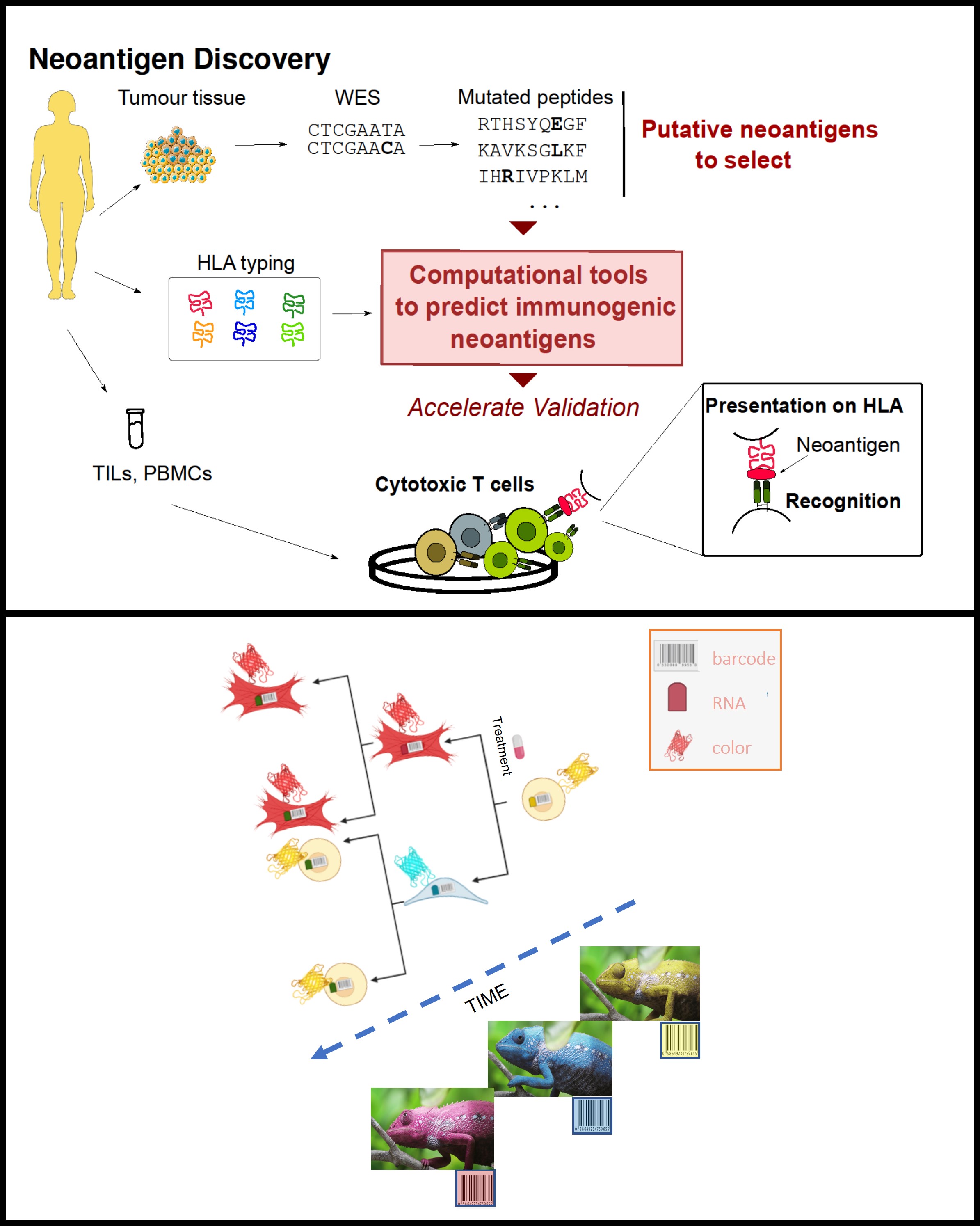

Please join us for a live webinar on the 30th March 15.00–16.00 at which Professor Axel Behrens (Cancer Research UK Convergence Science Centre Scientific Director) is pleased to host Dr Barbara Bravi and Dr Alejandra Bruna.
In this series of webinars brought to you by the Cancer Research UK Convergence Science Centre at Imperial College London and The Institute of Cancer Research, London, researchers across the two organisations will discuss key challenges facing cancer research and opportunities for new convergence science approaches to address these. Join us to consider how novel approaches and technologies could shed light on unresolved problems in cancer biology, to innovate new ways to address challenges in cancer and bring pioneering treatments to cancer patients faster.
Dr Barbara Bravi – Department of Mathematics, Imperial College London
“Modelling neoantigen presentation and recognition via flexible and interpretable machine learning models”
Presentation of neoantigens, and other tumor-associated antigens, by the human leukocyte antigen class I (HLA-I) proteins is key to the immune system’s ability to recognize malignancies. Identifying neoantigens is therefore crucial in innovative cancer vaccine and personalized immunotherapy design. In this talk I will discuss a flexible and easily interpretable method we have developed for prediction of HLA-presented antigens, based on the machine learning scheme of Restricted Boltzmann Machines (RBM). Such a method can be used as predictor of cancer neoantigens and viral epitopes, as well as to reconstruct peptide motifs presented on specific HLA-I molecules. I will next introduce a RBM-based approach to modelling the complementary process of recognition by T cells of presented, patient-specific neoantigens. The approach is able to discriminate responses specific to different neoantigens and to detect signatures of response, at the T-cell repertoire level, which are distinctive of patients’ long-term survival.
&
Dr Alejandra Bruna – Division of Molecular Pathology, The Institute of Cancer Research and The Royal Marsden NHS Foundation Trust
“Development and validation of innovative technological approaches to identify cell plasticity as an early evolutionary cancer driver in paediatric solid tumours”
The role of genetic evolution as a sole player in cancer progression has recently been intensely debated, with new evidence indicating a major role for cell plasticity and epigenetic rewiring in therapeutic resistance, underscoring a role for non-genetic mechanisms as drivers of evolution. We hypothesize that non-genetic evolutionary processes, and in particular cell plasticity, are key in driving paediatric cancer evolutionary processes where most children’s tumours are genomically silent yet show high developmental heterogeneity. We aim to develop empirical data to identify cell plasticity as an early cancer driver that primes for Darwinian evolutionary paths. However, little is known about how evolutionary and selective mechanisms interact with and/or replay developmental programmes to drive progression of malignancy or treatment resistance. Using paediatric cancer cell lines and patient derived ex vivo and in vivo models, combined with single cell track and tracing approaches, we are deciphering the role of phenotypic plasticity dynamics at single cell resolution in response to clinically relevant treatment strategies. In addition, we are developing and validating an innovative molecular recorder building on Cas9-editable lineage tracing tools to simultaneously temporally resolve the life history of sub-clonal interactions and developmental cell identity shifts.
About the speakers:
Dr Barbara Bravi
Dr Barbara Bravi is a Lecturer in Biomathematics in the Department of Mathematics at Imperial College London. Her research focusses on statistical inference methods for biological problems, in particular methods to reconstruct dynamics of biological networks and the sequence-function mapping in proteins. Areas of particular interest to her are immunology and cancer evolution.
Dr Alejandra Bruna
Dr Alejandra (Alex) Bruna is a cancer biologist who leads the Preclinical Modelling of Paediatric Cancer Evolution team at the Institute of Cancer Research, which she joined in 2020 with a career development faculty award. Since 2017, Dr Bruna has also lectured at the University of Cambridge. Her previous work at the Cancer Research UK Cambridge Institute focussed on leading preclinical programmes using improved patient-derived tumour models to build towards an integrative and personalised approach to cancer medicine. Her expertise in lineage tracing in cancer evolution, combining single-cell sequencing with molecular barcoding, is now employed in paediatric cancers, where she brings ex vivo and in vivo patient-derived preclinical and evolutionary modelling to help achieve kinder and smarter treatments for children with cancer.
To receive information about how to access this event please email icr-imperial-convergence.centre@imperial.ac.uk
Please note: This webinar is exclusively available only to colleagues across the Institute of Cancer Research, Imperial College London, the Royal Marsden Hospital and Imperial College Healthcare.
Image Credit: Dr Bravi & Dr Bruna